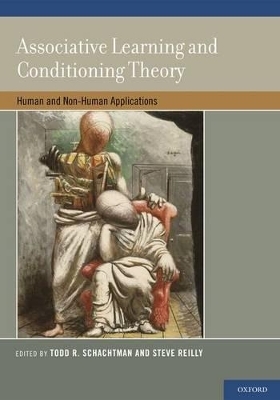
Associative Learning and Conditioning Theory
Oxford University Press Inc (Verlag)
978-0-19-973596-9 (ISBN)
Although many professionals in psychology (including the sub-disciplines of human learning and memory, clinical practice related to psychopathology, neuroscience, educational psychology and many other areas) no longer receive training in learning and conditioning, the influence of this field remains strong. Therefore, many researchers and clinicians have little knowledge about basic learning theory and its current applications beyond their own specific research topic. The primary purpose of the present volume is to highlight ways in which basic learning principles, methodology, and phenomena underpin, and indeed guide, contemporary translational research. With contributions from a distinguished collection of internationally renowned scholars, this 23-chapter volume contains specific research issues but is also broad in scope, covering a variety of topics in which associative learning and conditioning theory apply, such as drug abuse and addiction, anxiety, fear and pain research, advertising, attribution processes, acquisition of likes and dislikes, social learning, psychoneuroimmunology, and psychopathology (e.g., autism, depression, helplessness and schizophrenia). This breadth is captured in the titles of the three major sections of the book: Applications to Clinical Pathology; Applications to Health and Addiction; Applications to Cognition, Social Interaction and Motivation. The critically important phenomena and methodology of learning and conditioning continue to have a profound influence on theory and clinical concerns related to the mechanisms of memory, cognition, education, and pathology of emotional and consummatory disorders. This volume is expected to have the unique quality of serving the interests of many researchers, educators and clinicians including, for example, neuroscientists, learning and conditioning researchers, psychopharmacologists, clinical psychopathologists, and practitioners in the medical field.
Todd Schachtman obtained his Ph.D. from SUNY-Binghamton examining research on conditioning and associative learning. Steve Reilly obtained his D.Phil. from the University of York, England, for research concerning the neural basis of learning and memory.
Section I: Overview ; Things you always wanted to know about conditioning, but were afraid to ask ; Todd R. Schachtman and Steve Reilly ; Section II: Applications to Clinical Pathology ; Fear extinction and emotional processing theory: A critical review ; Seth J. Gillihan and Edna Foa ; Fear Conditioning and Attention to Threat: An Integrative Approach to Understanding the Etiology of Anxiety Disorders ; Katherine Oehlberg and Susan Mineka ; Behavioral techniques to reduce relapse after exposure therapy: Applications of studies of experimental extinction ; Mario A. Laborda, Bridget L. McConnell, and Ralph R. Miller ; Learning and anxiety ; Peter F. Lovibond ; Trauma, learned helplessness, its neuroscience and implication for PTSD ; Vincent M. LoLordo and J. Bruce Overmier ; Abberant attentional processes in schizophrenia as reflected in latent inhibition data ; Robert E. Lubow ; Discrimination learning process in autism: spectrum disorders: A comparator theory ; Phil Reed ; Section III: Applications to Health and Addiction ; Conditioned Immunomodulation ; Jennifer L. Szczytkowski and Donald T. Lysle ; Learning, Expectancy and Behavioural Control: Implications for drug use ; M. Vogel-Sprott and Mark T. Fillmore ; Applications of Contemporary Learning Theory in the Treatment of Drug Abuse ; Danielle E. McCarthy, Timothy B. Baker, Haruka Minami, and Vivian Yeh ; Internal stimuli generated by abused substances: Role of Pavlovian conditioning and its implications for drug addiction ; Rick A. Bevins and Jennifer E. Murray ; Learning to eat: The influence of food cues on what, when and how much we eat ; Janet Polivy, C. Peter Herman, and Laura Girz ; Conditional analgesia, negative feedback & error correction ; Moriel Zelikowsky and Michael S. Fanselow ; Incentives in the modification and cessation of cigarette smoking ; Edwin B. Fisher, Leonard Green, Amanda L. Calvert, & Russell E. Glasgow ; Section IV: Applications to Cognition, Social Interaction and Motivation ; Social learning and connectionism ; Frank Van Overwalle ; Application of associative learning paradigms to clinically relevant individual differences in cognitive processing ; Teresa A. Treat, John L. Kruschke, Richard J. Viken, and Richard M. McFall ; A review of procedural knowledge about the mental process models of evaluative conditioning ; Jan De Houwer ; Instrumental and Pavlovian Conditioning Analogues of Familiar Social Processes ; Robert Ervin Cramer and Robert Frank Weiss ; The impact of social cognition on emotional learning from and about others: A neurobiological perspective ; Andreas Olsson ; Effects of Conditioning in Advertising ; Todd R. Schachtman, Jennifer Walker and Stephanie Fowler ; Applications of Pavlovian conditioning to sexual behavior and reproduction ; Michael Domjan and Chana K. Akins ; Hot and bothered: Classical conditioning of sexual incentives in humans ; Heather Hoffman
| Erscheint lt. Verlag | 9.6.2011 |
|---|---|
| Zusatzinfo | 71 illustrations |
| Verlagsort | New York |
| Sprache | englisch |
| Maße | 254 x 178 mm |
| Gewicht | 1229 g |
| Themenwelt | Geisteswissenschaften ► Psychologie ► Allgemeine Psychologie |
| Geisteswissenschaften ► Psychologie ► Pädagogische Psychologie | |
| Geisteswissenschaften ► Psychologie ► Sozialpsychologie | |
| Geisteswissenschaften ► Psychologie ► Verhaltenstherapie | |
| ISBN-10 | 0-19-973596-4 / 0199735964 |
| ISBN-13 | 978-0-19-973596-9 / 9780199735969 |
| Zustand | Neuware |
| Informationen gemäß Produktsicherheitsverordnung (GPSR) | |
| Haben Sie eine Frage zum Produkt? |
aus dem Bereich


